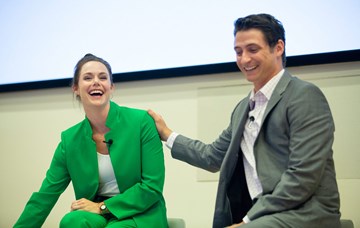So you want to be a better leader? Here’s how.
This year’s HBA Leadership Day opened with a panel of industry experts, who shared advice with first-year business students about how to be a better leader. The panel included Ivey alumni Andy Chisholm, MBA ’85, Director, Royal Bank of Canada and Mona Malone, HBA ’94, Chief Talent Officer, BMO Financial Group, as well as Franca Gucciardi, CEO, McCall MacBain Foundation.
Organized and executed by the Ian O. Ihnatowycz Institute for Leadership, HBA Leadership Day also featured a mini-case class and a keynote speech from Tessa Virtue and Scott Moir.
Here are 10 ways to be a better leader:
- Be authentic.
Gucciardi: Be yourself. Don’t hide it. In your 20s, you feel like you should act like a grown up instead of realizing you need to act like yourself. Be comfortable in the way you are. - Think big picture.
Chisholm: I’ve seen so many people get so myopic about how much they’re earning compared to the next person, and how big their office is compared to the next person. That notion of short-term orientation on money and status will hurt you. It’s a long game. Everything falls into place if you’re doing the right stuff. - Look for life mentors, not just career mentors.
Malone: I don’t think about mentors just in terms of career. I have mentors for all the things that matter in my life. Conversations with people who have been in your situation and who know you well are enormously valuable. - Build relationships.
Gucciardi: Mentorship isn’t a transactional experience. Allow yourself just to be curious about human begins. The worst thing you can do is go to someone and say “I’d like you to be my mentor.” Keep it simple as opposed to formalizing it. You don’t have to know where the relationships will lead you. Build your posse of really interesting people who align with your values. That in itself will give you lots. - Learn to delegate.
Malone: The way people delegate is one of the biggest failures when moving from sole contributor to first-time manager. They’re looking for people to do it exactly the way they would’ve done it. Recognize your role is to coach and guide. Give people space. People aren’t going to do things the way you do them, and that’s just fine. Maybe they’ll do it a better way. - Do everything with integrity.
Gucciardi: It’s very easy to take shortcuts. Integrity isn’t always those big moments, big decisions. It’s constant. It’s every day. All the little things make you a leader. - Add value.
Chisholm: How do you distinguish yourself? If you can think expansively and really add to your organization, that’s when you start getting on a path of differentiation. - Be open.
Malone: A leader plays a key role in either shutting down or opening up people’s contributions. Having an open mindset is really important. It’s about making sure everyone’s voice is heard. Ask yourself: Do you speak first, or do you ask for others’ contributions before you give your perspective. - Get outside your comfort zone.
Chisholm: Step outside the specialized area you might be focused on. Take a risk somewhere else. A huge barrier is being in your comfort zone and being worried about taking risks. Be open to opportunity. - Make mistakes.
Malone: I’ve made lots of mistakes. Make sure you have those experiences. If you’re not, maybe you’re not stretching yourself enough. Learning from failure is really important. That’s how you build resilience.



